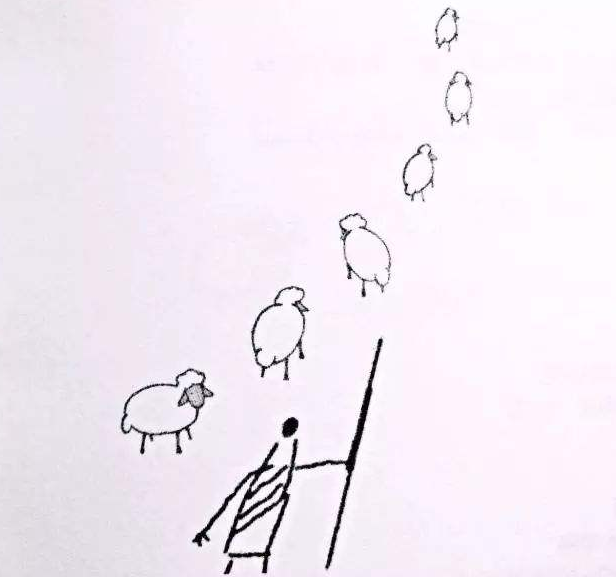Sometimes, their caravan met with another.
有時(shí)候,會(huì)在夜間與別的商隊(duì)相遇。
One always had something that the other needed—as if everything were indeed written by one hand.
總有一支商隊(duì)有另一支商隊(duì)所需的物資,就仿佛一切真的是由同一只手寫(xiě)就。
As they sat around the fire, the camel drivers exchanged information about windstorms, and told stories about the desert.
趕駝人相互交換關(guān)于風(fēng)暴的信息,并圍坐在篝火旁,講述沙漠里的故事。
At other times, mysterious, hooded men would appear; they were Bedouins who did surveillance along the caravan route.
還有的時(shí)候,會(huì)遇見(jiàn)一些戴風(fēng)帽的神秘人物。
They provided warnings about thieves and barbarian tribes.
他們是為商隊(duì)探路的貝都因人,給商隊(duì)提供有關(guān)劫匪和野蠻人部落的消息。
They came in silence and departed the same way, dressed in black garments that showed only their eyes.
這些人一襲黑衣,只露出一雙眼睛,悄無(wú)聲息地趕來(lái),悄無(wú)聲息地離去。
One night, a camel driver came to the fire where the Englishman and the boy were sitting.
有一天晚上,那趕駝人來(lái)到圣地亞哥和英國(guó)人圍坐著的篝火旁。
"There are rumors of tribal wars," he told them. The three fell silent.
“聽(tīng)說(shuō)部落之間打起仗來(lái)了。”三個(gè)人都陷入了沉默。
The boy noted that there was a sense of fear in the air, even though no one said anything.
雖然誰(shuí)都沒(méi)說(shuō)一句話,男孩卻發(fā)現(xiàn)空氣中彌漫著恐懼的氣息。
Once again he was experiencing the language without words ... the universal language.
他再次覺(jué)察到了那種語(yǔ)言,即宇宙的語(yǔ)言。

The Englishman asked if they were in danger.
過(guò)了一會(huì)兒,英國(guó)人問(wèn)是不是有危險(xiǎn)。
"Once you get into the desert, there's no going back," said the camel driver.
“一旦進(jìn)人沙漠,就不能走回頭路。”趕駝人說(shuō),
"And, when you can't go back, you have to worry only about the best way of moving forward.
“既然不能回頭,我們就只應(yīng)該關(guān)心今后以什么方式行進(jìn)最好。
The rest is up to Allah, including the danger."
其余的事,包括危險(xiǎn)不危險(xiǎn),就都交給安拉來(lái)管了。”
And he concluded by saying the mysterious word: "Maktub."
他用那句神秘的話總結(jié)說(shuō):“馬克圖布。”
"You should pay more attention to the caravan," the boy said to the Englishman, after the camel driver had left.
“您得多注意觀察商隊(duì)。”趕駝人離開(kāi)以后,男孩對(duì)英國(guó)人說(shuō),
"We make a lot of detours, but we're always heading for the same destination."
“雖然商隊(duì)繞了許多圈子,卻始終奔向同一個(gè)方向。”
"And you ought to read more about the world," answered the Englishman.
“而你應(yīng)該多讀一些關(guān)于世界的書(shū)籍。”英國(guó)人說(shuō),
"Books are like caravans in that respect."
“讀書(shū)和觀察商隊(duì)具有同樣的作用。”
The immense collection of people and animals began to travel faster.
這支由人群和牲口組成的龐大隊(duì)伍開(kāi)始加快行進(jìn)的速度。
The days had always been silent, but now, even the nights—when the travelers were accustomed to talking around the fires—had also become quiet.
現(xiàn)在,大家不僅白天全沉默不語(yǔ),就連夜晚也變得悄無(wú)聲息了,而過(guò)去他們習(xí)慣于晚間聚在篝火旁聊天。
And, one day, the leader of the caravan made the decision that the fires should no longer be lighted, so as not to attract attention to the caravan.
有一天,商隊(duì)頭領(lǐng)決定連篝火也不點(diǎn)了,以免引起外人對(duì)商隊(duì)的注意。



